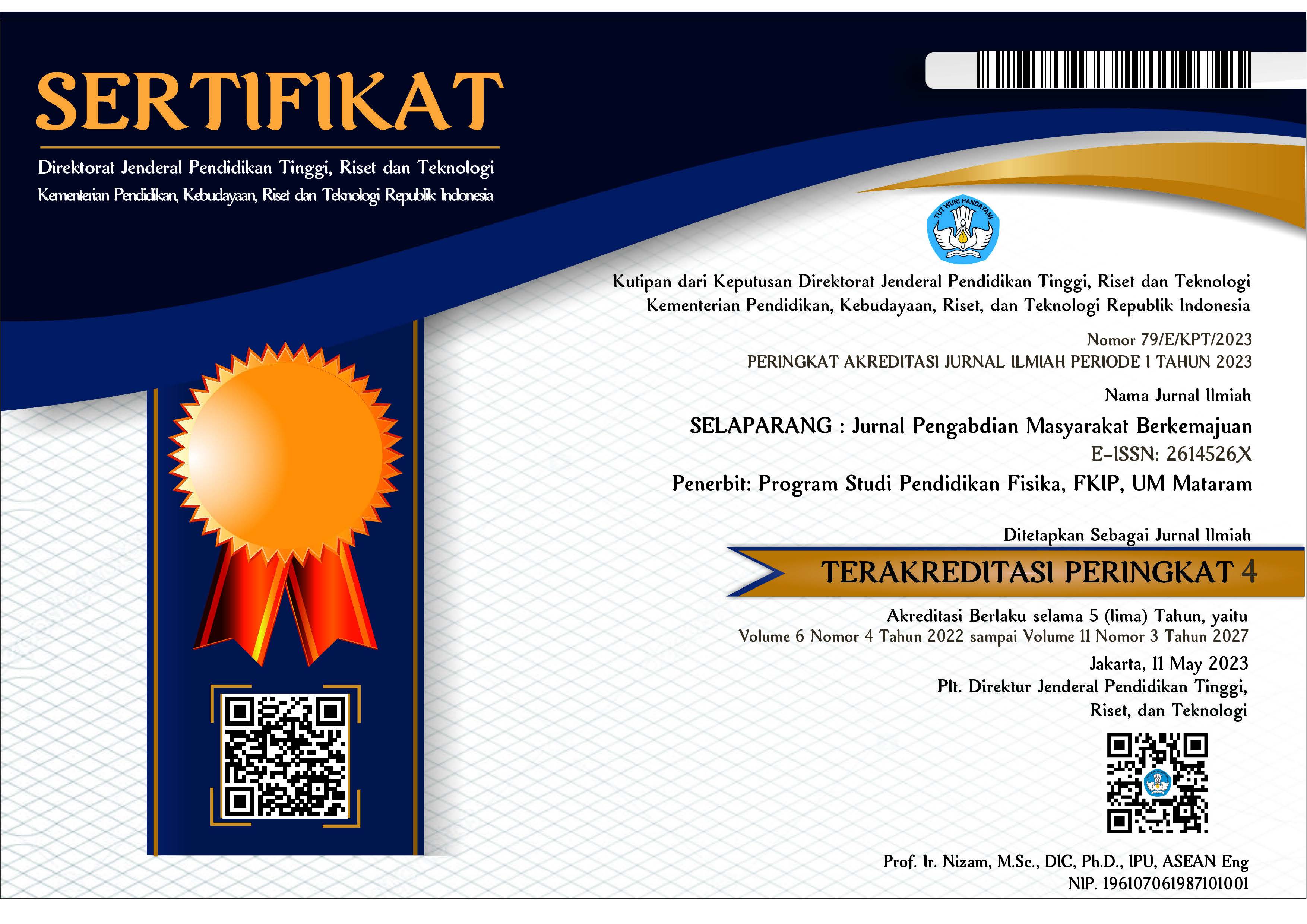Literasi digital berbasis AI: program peningkatan keterampilan teknologi untuk siswa SMAN 6 Denpasar
Abstract
Abstrak
Program pengabdian masyarakat ini bertujuan untuk meningkatkan literasi digital siswa SMA Negeri 6 Denpasar, khususnya dalam memahami dan memanfaatkan teknologi Artificial Intelligence (AI) dalam pembelajaran. Berdasarkan survei awal terhadap 40 siswa menggunakan skala Likert 1–5 (1 = sangat tidak setuju, 5 = sangat setuju), ditemukan bahwa pemahaman konsep AI (skor 1,83) dan pemanfaatannya dalam pembelajaran (skor 1,95) masih tergolong rendah, sementara pengalaman penggunaan teknologi AI memperoleh skor 2,56. Selain itu, dilakukan asesmen tambahan terhadap pengetahuan awal siswa terkait keamanan digital dan privasi data, yang menunjukkan pemahaman dasar yang belum memadai. Program ini dilaksanakan dalam dua sesi yang melibatkan metode interaktif, seperti presentasi, diskusi, praktik langsung, dan workshop berbasis simulasi. Sesi pertama berfokus pada sosialisasi literasi digital dan keterampilan prompting menggunakan chatbot AI seperti ChatGPT. Sesi kedua mengajarkan penerapan AI dalam pembelajaran terpadu, termasuk penggunaan aplikasi berbasis AI untuk merangkum bacaan (misalnya QuillBot, SciSummary) dan menjawab soal berbasis teks (misalnya ChatGPT, Perplexity). Hasil evaluasi menunjukkan bahwa 85% peserta berhasil menjawab lima pertanyaan evaluasi dengan benar, mencerminkan peningkatan pemahaman yang signifikan. Selain itu, peserta menunjukkan antusiasme tinggi dan merasa lebih percaya diri dalam memanfaatkan AI sebagai alat bantu belajar. Program ini tidak hanya meningkatkan keterampilan siswa dalam menggunakan teknologi AI secara efektif, tetapi juga membangun kesiapan mereka menghadapi tantangan era digital. Hasil ini menunjukkan bahwa pelatihan literasi digital berbasis AI dapat menjadi solusi efektif dalam meningkatkan kompetensi digital siswa sekolah menengah.
Kata kunci: AI; chatbot; literasi digital; pembelajaran; prompting .
Abstract
This community service program aimed to enhance the digital literacy of high school students at SMA Negeri 6 Denpasar, particularly in understanding and utilizing Artificial Intelligence (AI) technologies in learning. An initial survey involving 40 students using a 5-point Likert scale (1 = strongly disagree, 5 = strongly agree) revealed low levels of conceptual understanding of AI (mean score = 1.83) and its utilization in learning (mean score = 1.95), while experience with AI technology scored moderately (mean = 2.56). In addition, a preliminary assessment of students’ knowledge of digital security and data privacy showed limited awareness. The program was implemented in two interactive sessions, employing presentations, discussions, hands-on practice, and simulation-based workshops. The first session focused on digital literacy awareness and prompting skills using AI chatbots, while the second session introduced practical applications of AI in integrated learning, such as summarizing reading materials and answering subject-related questions using tools like ChatGPT, Perplexity, and QuillBot. Evaluation results showed that 85% of participants answered all five evaluation questions correctly, indicating a significant improvement in their understanding. Students also reported high enthusiasm and increased confidence in using AI as a learning tool. This program not only enhanced students' skills in effectively utilizing AI technology but also prepared them to face the challenges of the digital era. The findings demonstrate that AI-based digital literacy training can serve as an effective strategy for improving secondary school students' digital competencies.
Keywords: AI; chatbot; digital literacy; learning; prompting
Keywords
Full Text:
PDFReferences
Adiguzel, T., Kaya, M., & Cansu, F. (2023). Revolutionizing education with AI: Exploring the transformative potential of ChatGPT. Contemporary Educational Technology. https://doi.org/10.30935/cedtech/13152
Barokah, S., & Anggraini, Z. (2022). Peningkatan peran siswa SMP Muhammadiyah 1 Wangon melalui entrepreneurship education. SELAPARANG: Jurnal Pengabdian Masyarakat Berkemajuan. https://doi.org/10.31764/jpmb.v6i1.7377
Chang, D., Lin, M., Hajian, S., & Wang, Q. (2023). Educational design principles of using AI chatbot that supports self-regulated learning in education: Goal setting, feedback, and personalization. Sustainability, 15(17), 12921. https://doi.org/10.3390/su151712921
Cho, H., & Adams, D. (2022). Service-learning as a means for preparing preservice teachers to work with English language learners. In Research Anthology on Service Learning and Community Engagement Teaching Practices (Chapter 4). https://doi.org/10.4018/978-1-5225-4041-0.CH004
Diani, O., & Amiruddin, A. (2023). Students’ digital literacy skill at Universitas PGRI Palembang. Journal of Social Work and Science Education, 4(3). https://doi.org/10.52690/jswse.v4i3.481
Farinetti, L., & Canale, L. (2024). Chatbot development using LangChain: A case study to foster critical thinking and creativity. In Proceedings of the 2024 on Innovation and Technology in Computer Science Education V. 1. https://doi.org/10.1145/3649217.3653557
Harahap, D. (2024). Implementation of ChatGPT to improve students' critical thinking abilities. Indonesian Journal of Education and Social Humanities, 1(2). https://doi.org/10.62945/ijesh.v1i2.58
Haryani, E., Cobern, W., & Pleasants, B. (2019). Indonesia vocational high school science teachers’ priorities regarding 21st century learning skills in their science classrooms. Journal of Research in Science Mathematics and Technology Education. https://doi.org/10.31756/JRSMTE.224
Nguyen, N. (2023). Exploring the role of AI in education. London Journal of Social Sciences. https://doi.org/10.31039/ljss.2023.6.108
Orzhel, O. (2022). Innovation in higher education: Service learning. Continuing Professional Education: Theory and Practice, 1, 60–64. https://doi.org/10.28925/1609-8595.2022.1.8
Rusandi, M. A., Ahman, I., Saripah, I., Khairun, D. Y., & Mutmainnah. (2023). No worries with ChatGPT: Building bridges between artificial intelligence and education with critical thinking soft skills. Journal of Public Health. https://doi.org/10.1093/pubmed/fdad049
Shea, L., Harkins, D., Ray, S., & Grenier, L. (2022). How critical is service-learning implementation? Journal of Experiential Education, 46(2), 197–214. https://doi.org/10.1177/10538259221122738
SMA Negeri 6 Denpasar. (2025). SMA Negeri 6 Denpasar. https://sixsmadenpasar.sch.id (Accessed January 2, 2025)
Susanto, S., Andrianingsih, A., Sutawan, K., Marwintaria, V. A., & Astika, R. (2023). Transformation of learner learning: Improving reasoning skills through artificial intelligence (AI). Journal of Education, Religious, and Instructions (JoERI). https://doi.org/10.60046/joeri.v1i2.74
Zahrudin, F., Purwanto, A., & Budi, S. (2024). Educational system innovations for shaping an outstanding Indonesian generation. International Journal of Current Science Research and Review. https://doi.org/10.47191/ijcsrr/v7-i12-86
DOI: https://doi.org/10.31764/jpmb.v9i3.30726
Refbacks
- There are currently no refbacks.

This work is licensed under a Creative Commons Attribution-ShareAlike 4.0 International License.
______________________________________________________
Jurnal Selaparang
p-ISSN 2614-5251 || e-ISSN 2614-526X
EDITORIAL OFFICE:



















